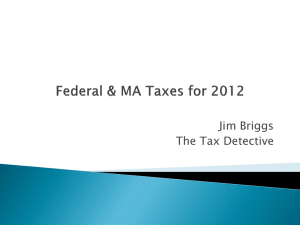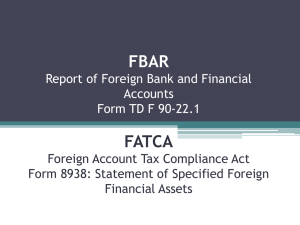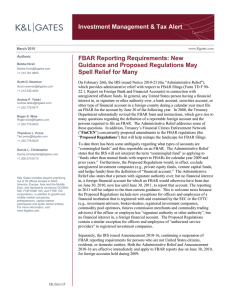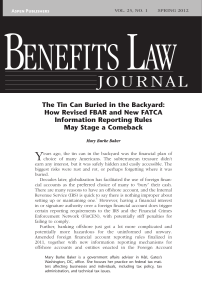Trust and Estates Law Update
advertisement
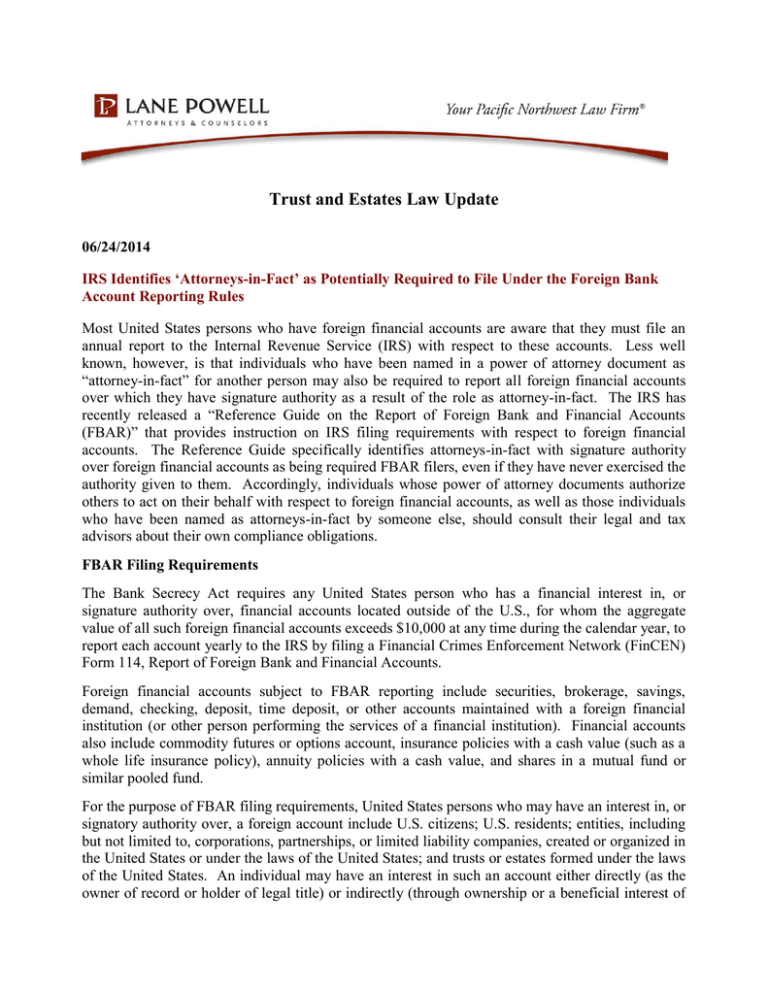
Trust and Estates Law Update 06/24/2014 IRS Identifies ‘Attorneys-in-Fact’ as Potentially Required to File Under the Foreign Bank Account Reporting Rules Most United States persons who have foreign financial accounts are aware that they must file an annual report to the Internal Revenue Service (IRS) with respect to these accounts. Less well known, however, is that individuals who have been named in a power of attorney document as “attorney-in-fact” for another person may also be required to report all foreign financial accounts over which they have signature authority as a result of the role as attorney-in-fact. The IRS has recently released a “Reference Guide on the Report of Foreign Bank and Financial Accounts (FBAR)” that provides instruction on IRS filing requirements with respect to foreign financial accounts. The Reference Guide specifically identifies attorneys-in-fact with signature authority over foreign financial accounts as being required FBAR filers, even if they have never exercised the authority given to them. Accordingly, individuals whose power of attorney documents authorize others to act on their behalf with respect to foreign financial accounts, as well as those individuals who have been named as attorneys-in-fact by someone else, should consult their legal and tax advisors about their own compliance obligations. FBAR Filing Requirements The Bank Secrecy Act requires any United States person who has a financial interest in, or signature authority over, financial accounts located outside of the U.S., for whom the aggregate value of all such foreign financial accounts exceeds $10,000 at any time during the calendar year, to report each account yearly to the IRS by filing a Financial Crimes Enforcement Network (FinCEN) Form 114, Report of Foreign Bank and Financial Accounts. Foreign financial accounts subject to FBAR reporting include securities, brokerage, savings, demand, checking, deposit, time deposit, or other accounts maintained with a foreign financial institution (or other person performing the services of a financial institution). Financial accounts also include commodity futures or options account, insurance policies with a cash value (such as a whole life insurance policy), annuity policies with a cash value, and shares in a mutual fund or similar pooled fund. For the purpose of FBAR filing requirements, United States persons who may have an interest in, or signatory authority over, a foreign account include U.S. citizens; U.S. residents; entities, including but not limited to, corporations, partnerships, or limited liability companies, created or organized in the United States or under the laws of the United States; and trusts or estates formed under the laws of the United States. An individual may have an interest in such an account either directly (as the owner of record or holder of legal title) or indirectly (through ownership or a beneficial interest of more than 50 percent in an entity holding such as a foreign account). Both direct and indirect interest can give rise to FBAR filing requirements. An individual has signatory authority over a foreign financial account where the individual, alone or with another person, has the ability to control the disposition of assets held in the account by communicating with the bank or other financial institution that maintains the account. Attorney-in-Fact Signature Authority Can Give Rise to FBAR Filing Requirements The IRS’s recently released “Reference Guide on the Report of Foreign Bank and Financial Accounts (FBAR)” includes the following example with respect to the filing obligation of an attorney-in-fact with signature authority over foreign accounts: Example: Megan, a U.S. resident, has a power of attorney on her elderly parents’ accounts in Canada, but she has never exercised the power of attorney. Megan is required to file an FBAR if the power of attorney gives her signature authority over the financial accounts. Whether or not the authority is ever exercised is irrelevant to the FBAR filing requirement. If you have executed a power of attorney that gives your attorney-in-fact signature authority over foreign accounts, you should take steps to make sure you have not inadvertently subjected your attorneys-in-fact to liability for failure to file the required FBAR. If the power of attorney document provides such signature authority, then you should inform your attorneys-in-fact of their potential filing requirements and provide the attorney-in-fact with the information about the foreign accounts that they will need in order to comply with their FBAR filing requirements. Alternatively, you may want to consider revising your power of attorney to limit your attorney-in-fact’s signature authority with respect to foreign financial accounts, so that he or she does not face liability for failure to file the required FBAR. Considering the scope of your power of attorney is important because, as described in the above example from the IRS’s Reference Guide, it is not relevant whether your attorney-in-fact has ever exercised any signature authority over your foreign financial accounts. What the IRS cares about is whether your attorney-in-fact has the authority to do so, even if he or she does not know about the authority or has never acted on the authority. Penalties for Failure to File an FBAR Failure to file an FBAR when required to do so may result in civil penalties, criminal penalties, or both. Civil penalties range from as little as $500 (for violations that are merely negligent) to $10,000 (for each non-willful violation), or even as much as the greater of $100,000 or 50 percent of the amount in the account (for each “willful” violation). It is possible for the IRS to assert civil penalties for FBAR violations in amounts that exceed the total balance in the foreign financial account(s). Criminal penalties for willfully failing to file an FBAR can be as much as $250,000 and/or five years in jail (or up to $500,000 and/or 10 years in jail if in conjunction with violating certain other laws). The criminal penalty for knowingly and willingly filing a false FBAR is $10,000 or five years in jail, or both. The IRS’s Voluntary Disclosure Program provides an opportunity for taxpayers that have failed to comply with the FBAR filing requirement (and/or other offshore tax violations) in the past to come 2 into compliance with U.S. tax laws with a reasonable degree of certainty as to the total cost of resolving their offshore tax issues. Taxpayers with undisclosed foreign accounts who make a voluntary disclosure may be able to avoid substantial civil penalties, and generally eliminate the risk of criminal prosecution. Consult Your Advisors If you have any concerns about either your own or your attorney-in-fact’s potential FBAR filing requirements, or about liability for failure to file, you should consult with your attorney or accountant. FBAR filings for 2013 must be received by the Department of the Treasury on or before June 30, 2014. FBARs are filed separately from an individual’s federal income tax return, and the granting by the IRS of an extension to file federal income tax returns does not extend the due date for filing an FBAR. The June 30th filing date may not be extended. For more information, please contact the Trust and Estates Practice Group at Lane Powell: trustandestates@lanepowell.com This is intended to be a source of general information, not an opinion or legal advice on any specific situation, and does not create an attorney-client relationship with our readers. If you would like more information regarding whether we may assist you in any particular matter, please contact one of our lawyers, using care not to provide us any confidential information until we have notified you in writing that there are no conflicts of interest and that we have agreed to represent you on the specific matter that is the subject of your inquiry. Copyright © 2014 Lane Powell PC Seattle | Portland | Anchorage | Tacoma | London 3
